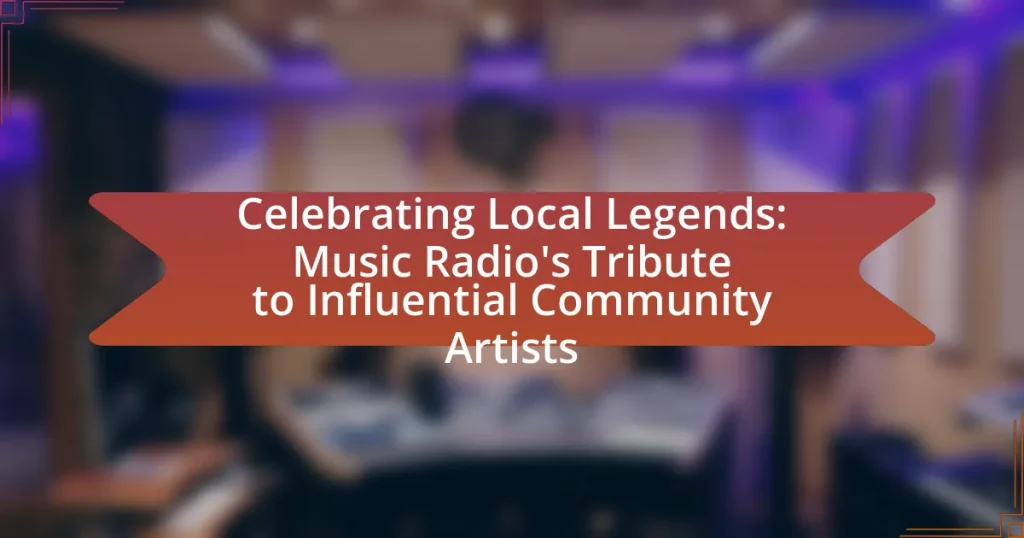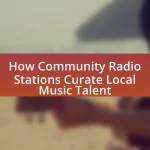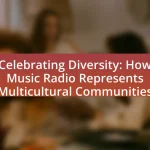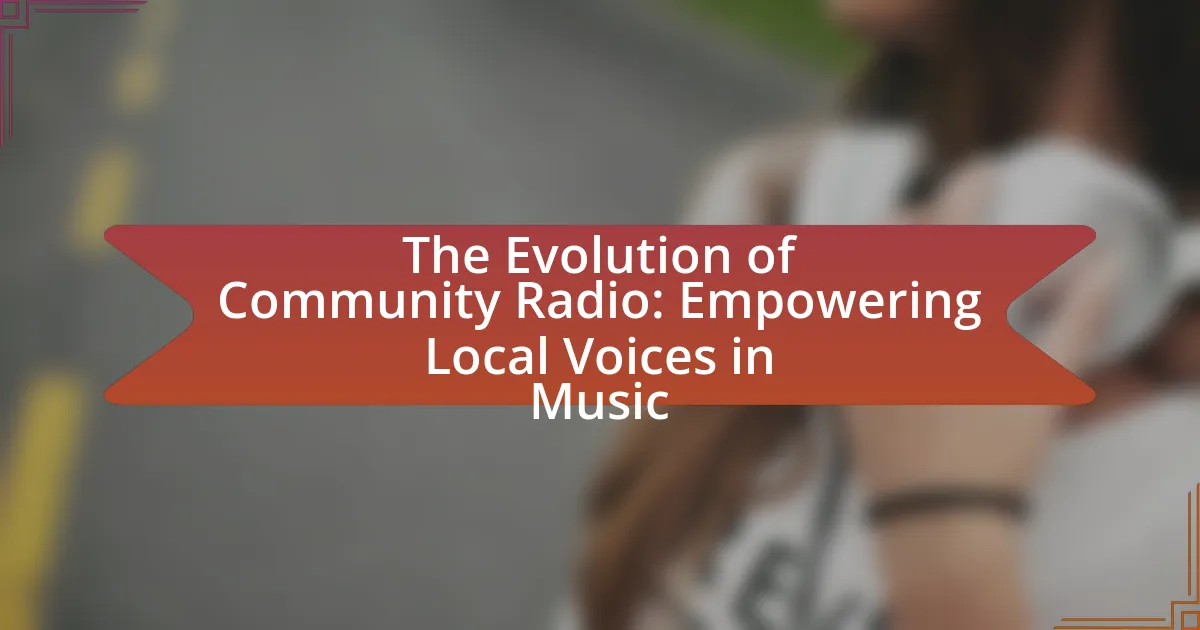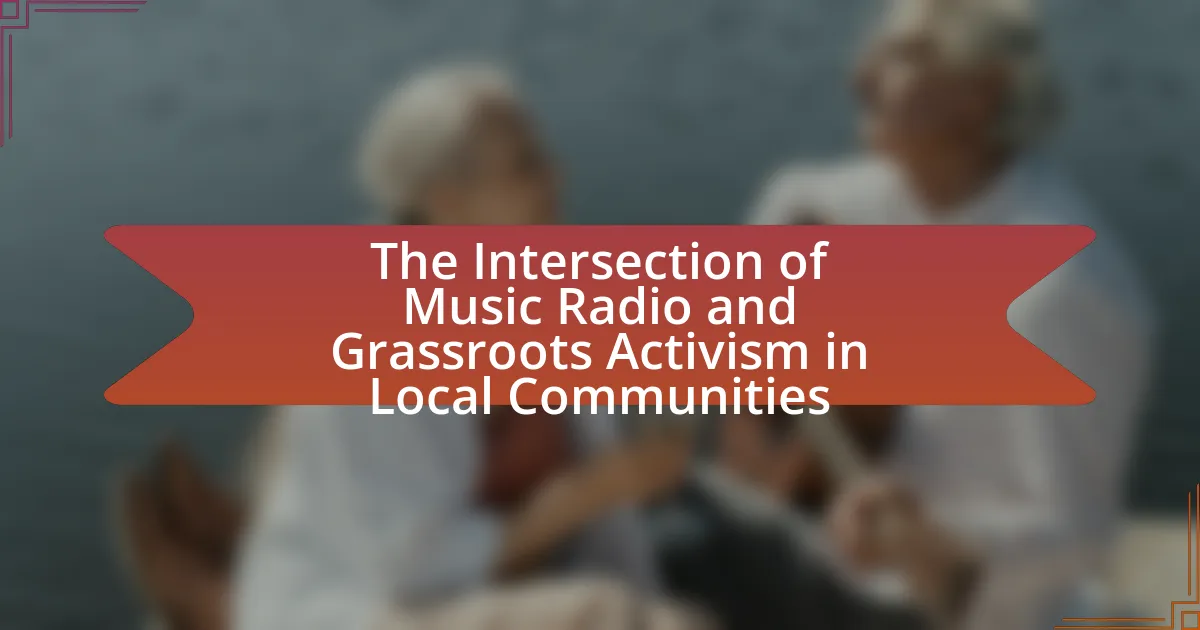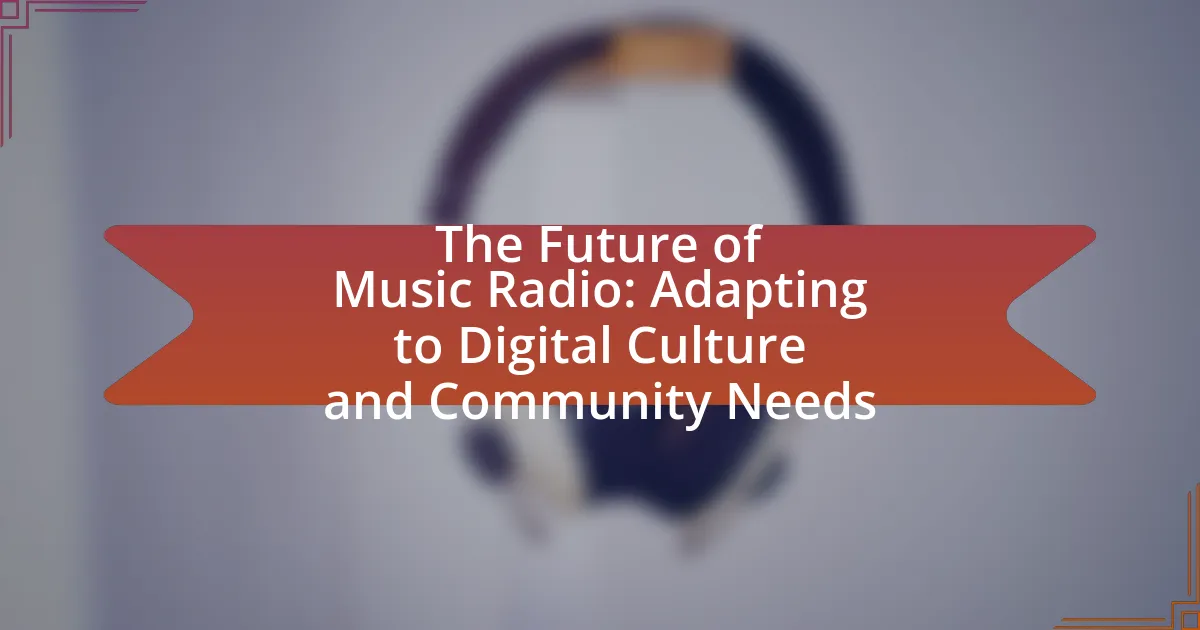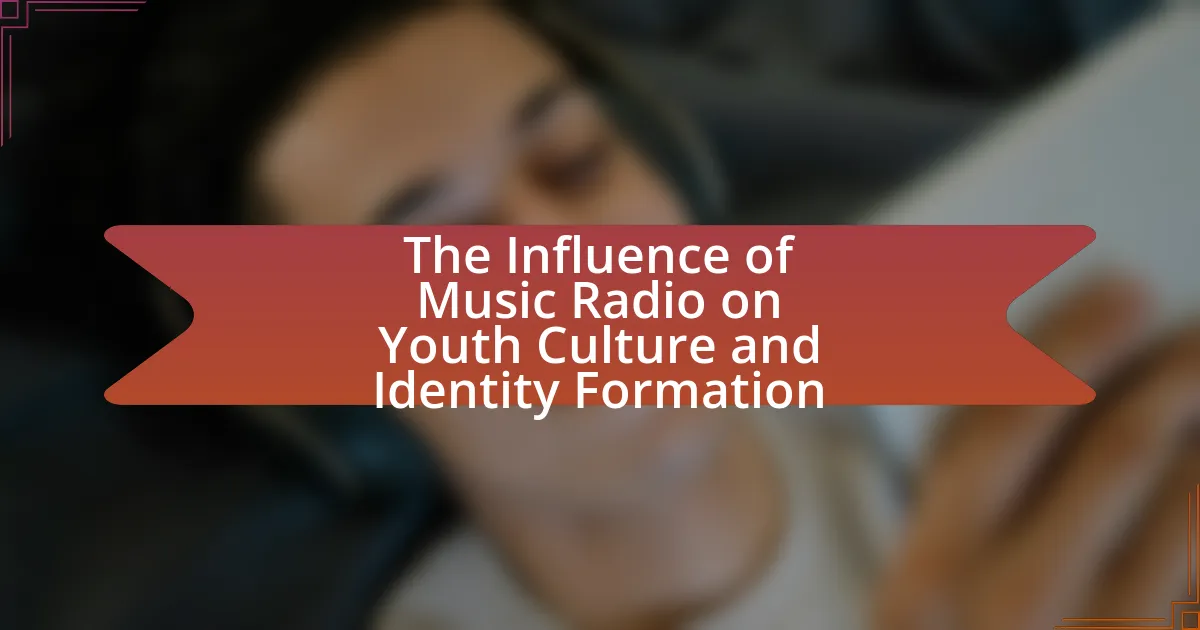The article focuses on the significance of celebrating local legends in music radio, emphasizing the recognition of influential community artists who have shaped the local music scene. It outlines how music radio stations identify these artists through audience engagement and social media analytics, and the criteria used to assess their influence, including community engagement and cultural impact. The piece also discusses the differences between local legends and mainstream artists, the importance of honoring local talent for community identity, and the various methods radio stations employ to pay tribute, such as dedicated programming and community events. Additionally, it highlights the role of listeners in supporting local artists and the strategies that can be implemented to ensure ongoing support for local music scenes.
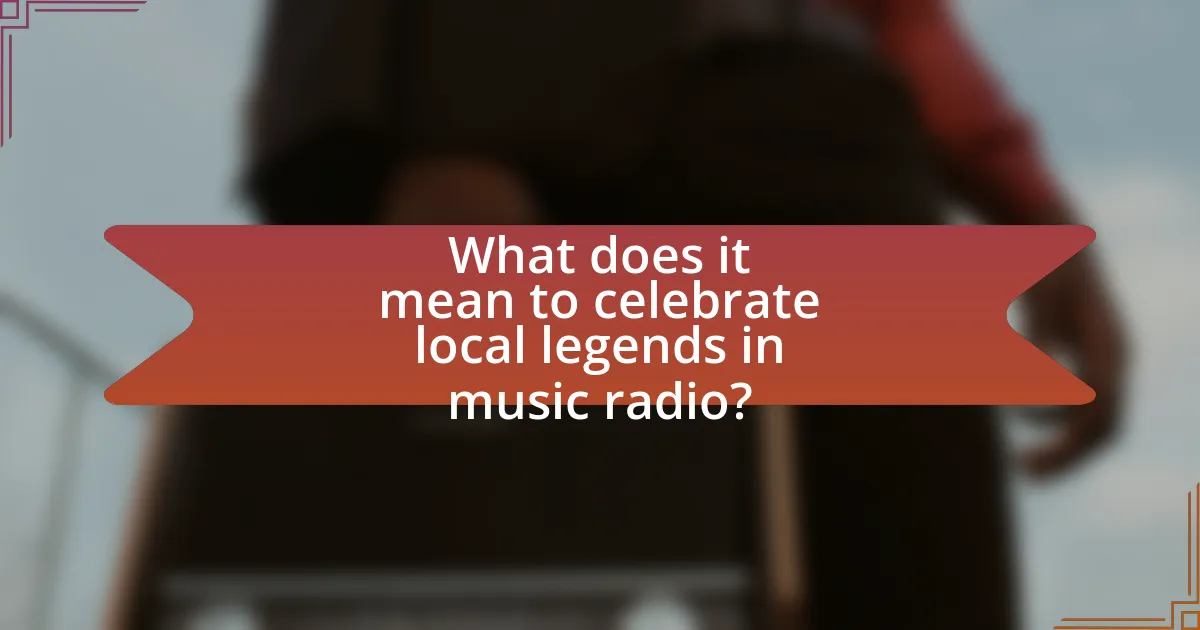
What does it mean to celebrate local legends in music radio?
Celebrating local legends in music radio means recognizing and honoring influential artists from the community who have made significant contributions to the local music scene. This celebration often involves playing their music, sharing their stories, and highlighting their impact on the culture and community. For instance, many radio stations dedicate special segments or events to showcase the work of these artists, thereby fostering a sense of pride and connection among listeners. This practice not only preserves local musical heritage but also supports the artists by increasing their visibility and appreciation within the community.
How do music radio stations identify influential community artists?
Music radio stations identify influential community artists through a combination of audience engagement, local music charts, and social media analytics. Stations often monitor listener requests and feedback to gauge which artists resonate most with the community. Additionally, they analyze local music charts that reflect airplay and streaming statistics to identify trending artists. Social media platforms provide valuable insights, as stations track mentions, shares, and overall engagement related to specific artists, helping them recognize those who have a significant impact on the local music scene.
What criteria are used to determine an artist’s influence in the community?
An artist’s influence in the community is determined by criteria such as community engagement, cultural impact, and recognition by peers. Community engagement refers to the artist’s active participation in local events, workshops, and initiatives that foster artistic expression and collaboration. Cultural impact assesses how the artist’s work resonates with and reflects the values, struggles, and aspirations of the community, often measured through audience reception and participation in their projects. Recognition by peers includes awards, nominations, and features in local media, which signify the artist’s standing and respect within the artistic community. These criteria collectively provide a comprehensive view of an artist’s influence and contribution to their community.
How do local legends differ from mainstream artists?
Local legends differ from mainstream artists primarily in their cultural significance and community connection. Local legends often have deep roots in their specific communities, reflecting local traditions, stories, and experiences, which resonate strongly with local audiences. In contrast, mainstream artists typically achieve broader recognition and commercial success, often appealing to a wider audience through mass media channels. For example, local legends may perform at community events or local venues, fostering a sense of belonging and identity, while mainstream artists often tour internationally and are marketed through major record labels. This distinction highlights the unique role local legends play in preserving cultural heritage and fostering community ties, which is less emphasized in the commercialized approach of mainstream artists.
Why is it important to honor local artists through music radio?
Honoring local artists through music radio is important because it fosters community identity and supports cultural diversity. Music radio serves as a platform that amplifies the voices of local musicians, allowing them to reach wider audiences and gain recognition. This recognition can lead to increased opportunities for local artists, such as performances, collaborations, and funding, which are crucial for their artistic development. Furthermore, studies have shown that local music can enhance community pride and cohesion, as it reflects the unique stories and experiences of the area. By promoting local talent, music radio not only enriches the cultural landscape but also strengthens the economic viability of the local music scene.
What impact does recognition have on local artists’ careers?
Recognition significantly enhances local artists’ careers by increasing their visibility and credibility within the community and the broader music industry. When local artists receive recognition, such as awards or media coverage, it often leads to more performance opportunities, collaborations, and access to funding or grants. For instance, a study by the National Endowment for the Arts found that artists who are recognized by local organizations are 50% more likely to secure gigs and sponsorships compared to those who are not recognized. This increased exposure can also lead to a larger fan base, which is crucial for sustaining a successful career in the arts.
How does celebrating local legends strengthen community ties?
Celebrating local legends strengthens community ties by fostering a sense of shared identity and pride among residents. When communities honor their local artists and influential figures, it creates opportunities for collective remembrance and storytelling, which enhances social cohesion. Research indicates that communities with strong local cultural recognition experience increased participation in community events and initiatives, leading to stronger interpersonal relationships and collaboration. For example, events that celebrate local musicians often draw diverse groups together, promoting unity and mutual support, which are essential for a thriving community.
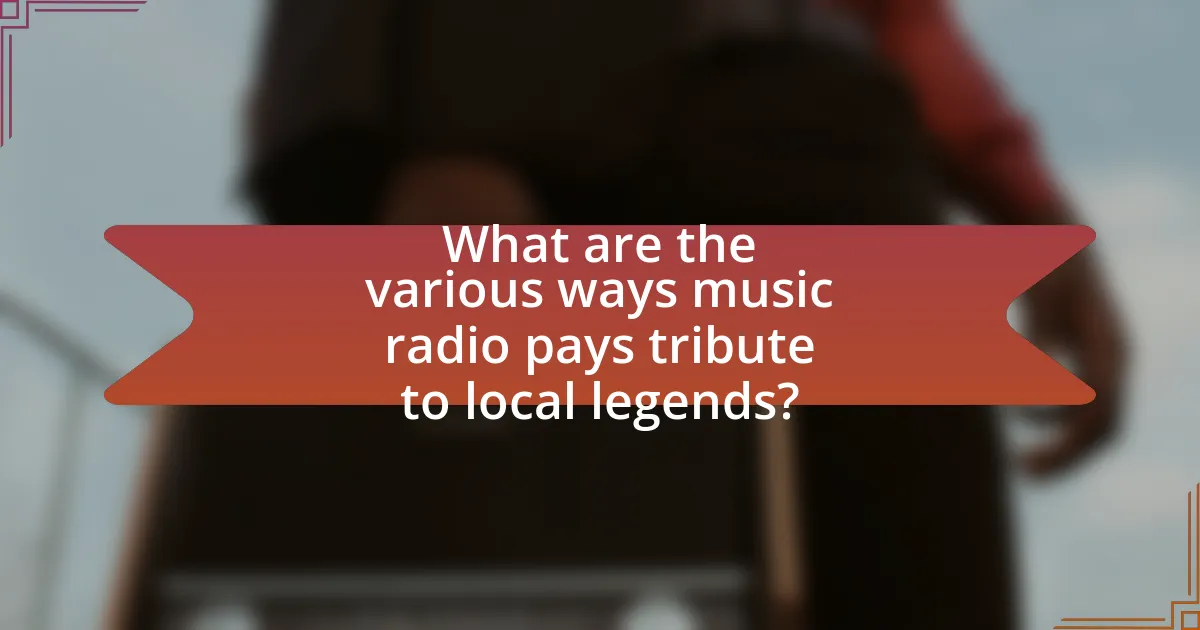
What are the various ways music radio pays tribute to local legends?
Music radio pays tribute to local legends through various methods, including dedicated programming, artist interviews, and special events. Dedicated programming often features playlists that highlight the music of local artists, showcasing their contributions to the community. Artist interviews provide a platform for local legends to share their stories and experiences, fostering a deeper connection with listeners. Additionally, music radio stations frequently organize special events, such as tribute concerts or anniversary celebrations, to honor the legacy of influential community artists, thereby reinforcing their cultural significance.
How do music radio stations feature local artists in their programming?
Music radio stations feature local artists in their programming by dedicating specific segments to showcase their music, often through live performances, interviews, and curated playlists. These stations may host events or contests that highlight local talent, providing a platform for emerging artists to reach a broader audience. For instance, many radio stations participate in initiatives like “Local Artist Spotlight” or “Homegrown Hour,” which focus exclusively on music produced within the community. This practice not only supports local musicians but also fosters a sense of community engagement and cultural identity, as evidenced by the increased listener loyalty and participation in local music events promoted by these stations.
What types of shows or segments highlight local talent?
Shows and segments that highlight local talent include talent showcases, artist interviews, and community spotlight features. Talent showcases provide a platform for local musicians and performers to present their work, often featuring live performances or recorded sessions. Artist interviews allow local artists to share their stories, inspirations, and creative processes, fostering a deeper connection with the audience. Community spotlight features focus on specific local events, festivals, or initiatives that celebrate the contributions of local artists, enhancing community engagement and support for the arts. These formats effectively promote local talent and contribute to the cultural landscape.
How do interviews and live performances contribute to the tribute?
Interviews and live performances significantly enhance the tribute by providing personal insights and showcasing the artistic talents of influential community artists. Interviews allow listeners to connect with the artists on a deeper level, revealing their motivations, experiences, and the impact they have had on the local music scene. For example, a radio interview with a local legend can highlight their journey and contributions, making their story relatable and inspiring to the audience. Live performances, on the other hand, create an immersive experience that celebrates the artist’s work, allowing fans to engage with their music in a dynamic setting. These performances often serve as a tribute event, bringing together the community to honor the artist’s legacy and influence. Together, interviews and live performances create a multifaceted tribute that not only commemorates the artist but also fosters community connection and appreciation for local talent.
What role do community events play in celebrating local legends?
Community events serve as vital platforms for celebrating local legends by fostering a sense of belonging and recognition within the community. These events often highlight the achievements and contributions of influential artists, creating opportunities for storytelling and shared experiences that honor their legacies. For instance, festivals or tribute concerts dedicated to local musicians not only showcase their work but also engage the community in preserving cultural heritage, as seen in events like the annual “Local Legends Festival,” which attracts thousands and emphasizes the importance of local talent.
How do music festivals and concerts showcase local artists?
Music festivals and concerts showcase local artists by providing them a platform to perform in front of larger audiences, thereby increasing their visibility and opportunities for exposure. These events often include dedicated slots for local talent, allowing them to share their music and connect with attendees who may not be familiar with their work. For instance, festivals like South by Southwest (SXSW) and local community events frequently feature local musicians, which can lead to increased fan engagement and potential collaborations. This practice not only supports the local music scene but also fosters community pride and cultural identity.
What partnerships can music radio form with local organizations for events?
Music radio can form partnerships with local organizations such as schools, community centers, non-profits, and local businesses for events. These collaborations can enhance community engagement and promote local artists. For instance, partnering with schools allows music radio to host talent shows or workshops that showcase student musicians, fostering local talent. Collaborating with non-profits can lead to fundraising events that support community causes while featuring local artists, thereby increasing visibility for both the radio station and the artists involved. Additionally, local businesses can sponsor events, providing financial support in exchange for advertising opportunities, which can create a mutually beneficial relationship that promotes local culture and music.
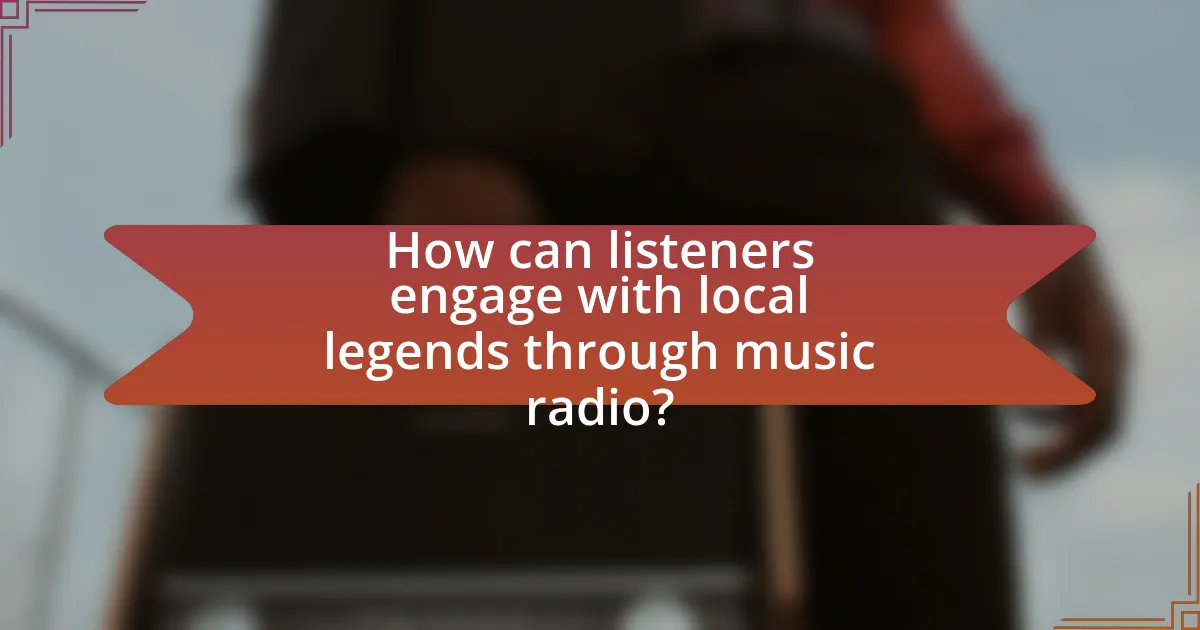
How can listeners engage with local legends through music radio?
Listeners can engage with local legends through music radio by participating in live call-ins, sharing personal stories, and requesting songs that celebrate these artists. Music radio stations often host programs dedicated to local legends, allowing listeners to connect directly with the music and the narratives surrounding these influential figures. For instance, stations may feature interviews with local artists or historians, providing context and background that enrich the listening experience. Additionally, community events promoted by radio stations, such as concerts or tribute shows, further facilitate engagement by bringing listeners together to celebrate the contributions of local legends in a shared space.
What opportunities do listeners have to support local artists?
Listeners have several opportunities to support local artists, including attending live performances, purchasing music directly from artists, and engaging with their content on social media platforms. By attending concerts or local gigs, listeners provide financial support and increase visibility for the artists. Purchasing music, whether through digital platforms or physical merchandise, directly contributes to the artists’ income. Additionally, sharing and promoting artists’ work on social media helps to expand their audience and reach, which is crucial for local artists seeking to grow their careers. These actions collectively foster a supportive community for local talent.
How can listeners participate in local music events promoted by radio stations?
Listeners can participate in local music events promoted by radio stations by attending the events, engaging with the station through social media, and entering contests for tickets or exclusive experiences. Radio stations often announce events on-air and online, providing details on how listeners can join. For example, many stations host live broadcasts from events, allowing listeners to interact and win prizes, thereby fostering community involvement and support for local artists.
What platforms allow listeners to share their favorite local artists?
Platforms that allow listeners to share their favorite local artists include social media networks like Facebook, Instagram, and Twitter, as well as music streaming services such as Spotify and SoundCloud. These platforms enable users to post, comment, and engage with content related to local artists, facilitating community interaction and support. For instance, Spotify allows users to create and share playlists featuring local talent, while SoundCloud provides a space for artists to upload their music and receive feedback from listeners.
What are the best practices for music radio stations in honoring local legends?
Music radio stations should implement community engagement initiatives, such as hosting tribute shows and events, to honor local legends. These practices create a platform for celebrating the contributions of influential artists within the community. For instance, stations can organize special programming that features interviews, music, and stories about local legends, thereby fostering a deeper connection between the artists and the audience. Additionally, collaborating with local organizations and artists for events can enhance visibility and appreciation for these figures. Research indicates that community-focused programming increases listener loyalty and engagement, which reinforces the importance of honoring local legends in a meaningful way.
How can radio stations effectively promote local artists while maintaining quality content?
Radio stations can effectively promote local artists while maintaining quality content by integrating artist features into their programming, such as interviews, live sessions, and dedicated segments that highlight local music. This approach not only showcases the talent within the community but also engages listeners with authentic stories and sounds that resonate with their local culture. Research indicates that local music exposure can increase listener loyalty; for instance, a study by the National Association of Broadcasters found that 70% of listeners prefer stations that support local artists. By balancing these features with high-quality production and diverse playlists, radio stations can create a platform that uplifts local talent while ensuring a rich listening experience.
What strategies can be implemented to ensure ongoing support for local music scenes?
To ensure ongoing support for local music scenes, strategies such as establishing community partnerships, promoting local events, and providing funding opportunities can be implemented. Community partnerships with local businesses and organizations can create a network that supports musicians through venues, sponsorships, and resources. Promoting local events, such as open mic nights and music festivals, increases visibility and engagement, fostering a sense of community around local artists. Additionally, providing funding opportunities through grants or crowdfunding initiatives can help sustain local musicians and venues, as evidenced by the success of programs like the National Endowment for the Arts, which has funded numerous local arts projects.
How can listeners contribute to the legacy of local legends?
Listeners can contribute to the legacy of local legends by actively engaging with their stories and sharing them within their communities. This engagement can take the form of attending local events, discussing the legends on social media, or creating content that highlights their contributions. For instance, when listeners share personal anecdotes or promote local artists through platforms like community radio or podcasts, they help preserve and amplify the cultural significance of these figures. Research indicates that community involvement in local arts can enhance cultural heritage appreciation, thereby solidifying the legacy of influential artists.
What actions can individuals take to promote local artists in their communities?
Individuals can promote local artists in their communities by organizing events such as art shows, concerts, or open mic nights that showcase their work. These events provide a platform for artists to gain visibility and connect with potential fans. Additionally, individuals can utilize social media to share artists’ work, create dedicated pages or groups to discuss and promote local talent, and encourage community members to support local art initiatives. Research indicates that community engagement in the arts can lead to increased local economic activity, as seen in studies by the National Endowment for the Arts, which highlight the positive impact of local art promotion on community cohesion and economic growth.
How can social media be leveraged to amplify the voices of local legends?
Social media can amplify the voices of local legends by providing platforms for sharing their stories, music, and achievements directly with a wider audience. By utilizing features such as live streaming, posts, and targeted advertising, local legends can engage with their community and beyond, fostering a sense of connection and support. For instance, platforms like Instagram and Facebook allow artists to showcase their work and interact with fans, while hashtags can help increase visibility and reach. According to a study by the Pew Research Center, 69% of adults in the U.S. use social media, making it an effective tool for local legends to gain recognition and build a following.
